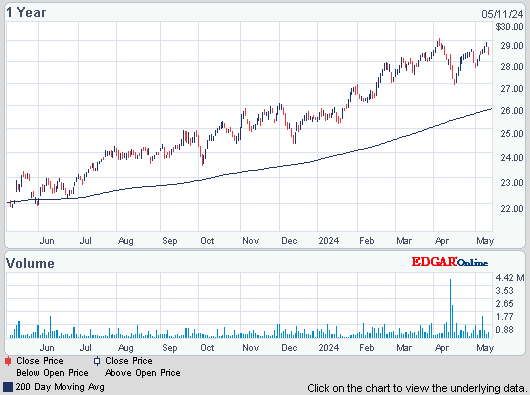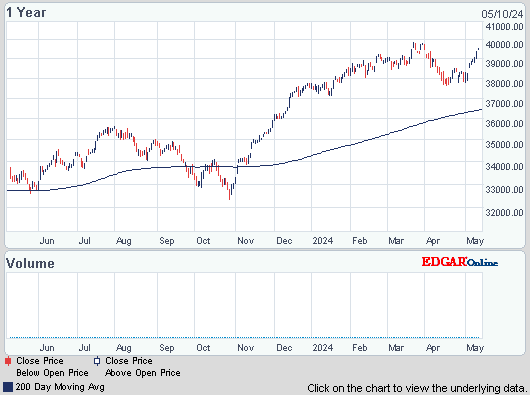Dow went up 80, advancers over decliners 5-2 & NAZ gained 22. The MLP index rebounded a very big 7+ to the 443s & the REIT index recovered 5 to the 285s. Junk bond funds were mixed & Treasuries rose. Oil had a good day & gold found buyers again.
AMJ (Alerian MLP Index tracking fund)

![Live 24 hours gold chart [Kitco Inc.]](http://www.kitco.com/images/live/gold.gif)


Photo: Bloomberg
US household wealth jumped to a record in Q1, exceeding its pre-recession peak for the first time, bolstered by gains in the stock & housing markets that are helping Americans mend finances. Net worth for households & non-profit groups increased $3T, or 4.5% from Q4, to $70T, the Federal Reserve (FED) said in its financial accounts report. Household wealth eclipsed its pre-recession level as gains in the stock & housing markets help Americans withstand an increase in the payroll tax this year. Lending rates kept low by the FED, coupled with further gains in employment, may continue to repair balance sheets & support consumer spending that makes up about 70% of the economy. Household net worth is $2.3T above its pre-recession peak of $68T reached in Q3 2007 & was $67T in Q4 2012. The value of financial assets owned by American households, including stocks & pension-fund holdings, increased by $2T in Q1.
U.S. Household Worth Tops Pre-Recession Peak for First Time

Photo: Bloomberg
German factory orders fell more than expected in Apr as the largest economy in Europe struggled to gain strength. Orders decreased 2.3% from Mar, when they increased a revised 2.3%, the Economy Ministry in Berlin said. The forecast was for a 1% drop. In the year, workday-adjusted orders fell 0.4%. At the same time, German business confidence rose in May for the first time since Feb, & consumer optimism is set to climb to the highest since 2007 in Jun, as higher wages boost spending power. The German economy grew only 0.1% in Q1, less than anticipated, & the Bundesbank will release new forecasts tomorrow. In Dec, the central bank predicted growth of 0.4% this year & 1.9% for 2014. Domestic orders declined 3.2% in Apr, while foreign demand dropped 1.5%, with orders from the euro area down 3.6%. Basic-goods orders fell 1.9% from Mar, while investment-goods orders slumped 3.6%. At the same time, demand for consumer goods surged 7.5% in Apr, with orders from the euro area jumping 14.8%.
Unemployment in Greece continued its record-setting rise in Mar, reaching 26.8% of the workforce compared to a revised 26.7% a month earlier. Figures set the total number of unemployed in Mar at 1.3M. In Mar 2008, just before Greece's finances imploded, forcing the country to accept intl bailouts in return for harsh austerity measures, just 390K were jobless. Youth unemployment remained extremely high, despite indications that the figures are beginning to stabilize as 58.3% of the 15-24 age group were jobless in Mar, compared to 63.8% in Feb.
Greek unemployment hits new high, at 26.8 percent AP

Photo: Bloomberg
Mortgage rates in the US rose for a 5th week, sending borrowing costs for a 30-year loan to the highest level in 14 months. The average rate for a 30-year fixed mortgage jumped to 3.91% in the week ended today, from 3.81%, according to Freddie Mac, & the average 15-year rate rose to 3.03% from 2.98%. Mortgage rates have been following gov bond yields higher as a strengthening economy stokes speculation that the FED will reduce efforts to push down borrowing costs. Rising rates have restrained refinancings. Applications for loans from homeowners seeking to reduce monthly payments dropped 15% last week to the lowest level since Nov 2011, according to an index from the Mortgage Bankers Association. The 15-year rate topped 3% for the first time since May of last year after hitting a record low of 2.56% last month. The record low for a 30-year loan is 3.31%, reached in Nov.
U.S. Mortgage Rates Climb for a Fifth Week With 30-Year at 3.91%
The bulls returned in force to bid up stocks in what had been another dreary day. Dow shot up more than 100 in the last few hours, to go back over 15K. Much of the buying went into beaten up high yield securities which have been hit hard in the last few weeks. The federal budget cuts may finally be working their way into economic statistics. Job growth is slowing, estimates for GDP growth are being reduced & investors are becoming nervous. Maybe austerity will depress jobs numbers tomorrow. But there was buying into the close. Do the elephants scare the mice or mice scare the elephants? The jobs report will show if this buying was warranted.
Dow Jones Industrials

AMJ (Alerian MLP Index tracking fund)
Treasury yields:
U.S. 3-month |
0.05% | |
U.S. 2-year |
0.29% | |
U.S. 10-year |
2.07% |
| CLX13.NYM | ...Crude Oil Nov 13 | ...94.45 |
![Live 24 hours gold chart [Kitco Inc.]](http://www.kitco.com/images/live/gold.gif)


Photo: Bloomberg
US household wealth jumped to a record in Q1, exceeding its pre-recession peak for the first time, bolstered by gains in the stock & housing markets that are helping Americans mend finances. Net worth for households & non-profit groups increased $3T, or 4.5% from Q4, to $70T, the Federal Reserve (FED) said in its financial accounts report. Household wealth eclipsed its pre-recession level as gains in the stock & housing markets help Americans withstand an increase in the payroll tax this year. Lending rates kept low by the FED, coupled with further gains in employment, may continue to repair balance sheets & support consumer spending that makes up about 70% of the economy. Household net worth is $2.3T above its pre-recession peak of $68T reached in Q3 2007 & was $67T in Q4 2012. The value of financial assets owned by American households, including stocks & pension-fund holdings, increased by $2T in Q1.
U.S. Household Worth Tops Pre-Recession Peak for First Time

Photo: Bloomberg
German factory orders fell more than expected in Apr as the largest economy in Europe struggled to gain strength. Orders decreased 2.3% from Mar, when they increased a revised 2.3%, the Economy Ministry in Berlin said. The forecast was for a 1% drop. In the year, workday-adjusted orders fell 0.4%. At the same time, German business confidence rose in May for the first time since Feb, & consumer optimism is set to climb to the highest since 2007 in Jun, as higher wages boost spending power. The German economy grew only 0.1% in Q1, less than anticipated, & the Bundesbank will release new forecasts tomorrow. In Dec, the central bank predicted growth of 0.4% this year & 1.9% for 2014. Domestic orders declined 3.2% in Apr, while foreign demand dropped 1.5%, with orders from the euro area down 3.6%. Basic-goods orders fell 1.9% from Mar, while investment-goods orders slumped 3.6%. At the same time, demand for consumer goods surged 7.5% in Apr, with orders from the euro area jumping 14.8%.
Unemployment in Greece continued its record-setting rise in Mar, reaching 26.8% of the workforce compared to a revised 26.7% a month earlier. Figures set the total number of unemployed in Mar at 1.3M. In Mar 2008, just before Greece's finances imploded, forcing the country to accept intl bailouts in return for harsh austerity measures, just 390K were jobless. Youth unemployment remained extremely high, despite indications that the figures are beginning to stabilize as 58.3% of the 15-24 age group were jobless in Mar, compared to 63.8% in Feb.
Greek unemployment hits new high, at 26.8 percent AP

Photo: Bloomberg
Mortgage rates in the US rose for a 5th week, sending borrowing costs for a 30-year loan to the highest level in 14 months. The average rate for a 30-year fixed mortgage jumped to 3.91% in the week ended today, from 3.81%, according to Freddie Mac, & the average 15-year rate rose to 3.03% from 2.98%. Mortgage rates have been following gov bond yields higher as a strengthening economy stokes speculation that the FED will reduce efforts to push down borrowing costs. Rising rates have restrained refinancings. Applications for loans from homeowners seeking to reduce monthly payments dropped 15% last week to the lowest level since Nov 2011, according to an index from the Mortgage Bankers Association. The 15-year rate topped 3% for the first time since May of last year after hitting a record low of 2.56% last month. The record low for a 30-year loan is 3.31%, reached in Nov.
U.S. Mortgage Rates Climb for a Fifth Week With 30-Year at 3.91%
The bulls returned in force to bid up stocks in what had been another dreary day. Dow shot up more than 100 in the last few hours, to go back over 15K. Much of the buying went into beaten up high yield securities which have been hit hard in the last few weeks. The federal budget cuts may finally be working their way into economic statistics. Job growth is slowing, estimates for GDP growth are being reduced & investors are becoming nervous. Maybe austerity will depress jobs numbers tomorrow. But there was buying into the close. Do the elephants scare the mice or mice scare the elephants? The jobs report will show if this buying was warranted.
Dow Jones Industrials











No comments:
Post a Comment